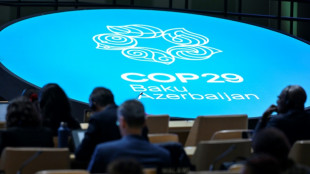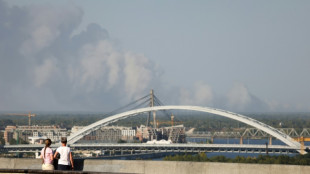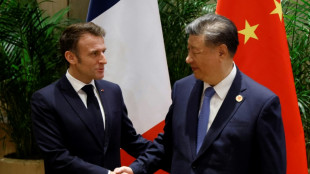
-
 US announces talks with Israel over civilian casualties in Gaza
US announces talks with Israel over civilian casualties in Gaza
-
SpaceX fails to repeat Starship booster catch, as Trump looks on

-
 G20 summit ends with Ukraine blame game
G20 summit ends with Ukraine blame game
-
Trump appoints TV celebrity 'Dr. Oz' to key US health post

-
 European stocks fall on Ukraine-Russia fears, US focused on earnings
European stocks fall on Ukraine-Russia fears, US focused on earnings
-
Last-gasp Szoboszlai penalty rescues Hungary draw with Germany

-
 Germany, Netherlands draw as Nations League group stage ends
Germany, Netherlands draw as Nations League group stage ends
-
Hong Kong tycoon Jimmy Lai takes witness stand in collusion trial

-
 Guardiola set to extend stay as Man City boss - reports
Guardiola set to extend stay as Man City boss - reports
-
Minnows Botswana hold Egypt to qualify with Mozambique, Tanzania

-
 Inter Miami coach Martino leaving club for 'personal reasons' - club source
Inter Miami coach Martino leaving club for 'personal reasons' - club source
-
Chinese man sentenced to 20 months for Falun Gong harassment in US

-
 Hong Kong court jails 45 democracy campaigners, drawing condemnation
Hong Kong court jails 45 democracy campaigners, drawing condemnation
-
'I did it for Rafa': Alcaraz after keeping Spain Davis Cup dream alive

-
 Alcaraz keeps Spain and Nadal Davis Cup dream alive
Alcaraz keeps Spain and Nadal Davis Cup dream alive
-
Trump names China hawk Howard Lutnick commerce secretary

-
 Europe's pivotal role in bid to strike COP29 climate deal
Europe's pivotal role in bid to strike COP29 climate deal
-
MotoGP champion Martin falls on Aprilia debut

-
 Bodies burned after Haiti police, civilians kill 28 alleged gang members
Bodies burned after Haiti police, civilians kill 28 alleged gang members
-
'Probably my last match': Nadal after Davis Cup singles defeat

-
 Iran faces new censure over lack of cooperation at UN nuclear meeting
Iran faces new censure over lack of cooperation at UN nuclear meeting
-
Afghan woman teacher, jailed Tajik lawyer share top rights prize

-
 Pressure mounts on Scholz over bid for second term
Pressure mounts on Scholz over bid for second term
-
Take two: Biden makes it into G20 leaders' photo

-
 Russia vows response after Ukraine fires long-range US missiles
Russia vows response after Ukraine fires long-range US missiles
-
Spain's Nadal loses in Davis Cup quarter-finals singles opener

-
 Four elite Brazil officers arrested over alleged 2022 Lula murder plot
Four elite Brazil officers arrested over alleged 2022 Lula murder plot
-
SpaceX set for Starship's next flight -- with Trump watching

-
 Trump ally seeks to block trans lawmaker from women's restrooms
Trump ally seeks to block trans lawmaker from women's restrooms
-
Slovakia oust Britain to meet Italy in BJK Cup title match

-
 Top-selling daily French daily Ouest-France stops posting on X
Top-selling daily French daily Ouest-France stops posting on X
-
Russian invasion toll on environment $71 billion, Ukraine says

-
 'Sabotage' suspected after two Baltic Sea cables cut
'Sabotage' suspected after two Baltic Sea cables cut
-
'You will die in lies!': daughter clashes with father at French rape trial

-
 Spain Women drop veterans Paredes and World Cup kiss victim Hermoso
Spain Women drop veterans Paredes and World Cup kiss victim Hermoso
-
Stocks diverge on fears of Ukraine-Russia escalation

-
 New Botswana leader eyes cannabis, sunshine to lift economy
New Botswana leader eyes cannabis, sunshine to lift economy
-
'Operation Night Watch': Rembrandt classic gets makeover

-
 Haiti police, civilians kill 28 gang members: authorities
Haiti police, civilians kill 28 gang members: authorities
-
Taxing the richest: what the G20 decided

-
 'Minecraft' to come to life in UK and US under theme park deal
'Minecraft' to come to life in UK and US under theme park deal
-
IMF, Ukraine, reach agreement on $1.1 bn loan disbursement

-
 Japan on cusp of World Cup as Son scores in Palestine draw
Japan on cusp of World Cup as Son scores in Palestine draw
-
Chelsea condemn 'hateful' homophobic abuse towards Kerr, Mewis

-
 Hamilton to race final three grands prix of Mercedes career
Hamilton to race final three grands prix of Mercedes career
-
Gatland has not become a 'bad coach' says Springboks' Erasmus

-
 Slovakia take Britain to doubles decider in BJK Cup semis
Slovakia take Britain to doubles decider in BJK Cup semis
-
Brazil arrests soldiers over alleged 2022 Lula assassination plot

-
 Ukraine war and climate stalemate loom over G20 summit
Ukraine war and climate stalemate loom over G20 summit
-
Ukraine fires first US long-range missiles into Russia


Europe warms up to Russian shipping blockade
After several days of delays and uncertainty, the Baltic Performer, a blue cargo ship laden with bananas from Ecuador, finally docked under grey skies at the Helsingborg port in southern Sweden.
One of Sweden's two main unions for dockworkers, the Swedish Dockworkers Union, decided at the end of March that it would not unload vessels with ties to Russia, in protest against Moscow's invasion of Ukraine.
The 150-meter freighter, operated by a Swedish subsidiary of the Russian company Baltic Shipping, was one of the first ships affected by that decision.
"We're blocking all goods linked to Russia and the regime", Rolf Lyktoft, head of the local dockworkers' chapter, told AFP.
Ukrainian President Volodymyr Zelensky has called for Russian vessels to be blocked from the ports of the "free world".
On Tuesday, the EU executive proposed banning Russian ships from European ports.
So far, none of the 27 EU member states has instituted a national ban -- unlike Britain, which did so in early March.
- 270 ships a month-
Analysts say Europe has been wary to move on the issue due to a fear of Russian reprisals over its oil deliveries.
In Helsingborg, Lyktoft acknowledged that the decision taken by his 1,400 colleagues was largely symbolic, with only a small number of Russian-linked cargo ships passing through Sweden's ports.
But he hoped for a snowball effect.
"We hope that the International Dockworkers Council will decide to take the next step, with a worldwide decision to not touch Russian goods", he said.
Helsingborg port officials have kept a low profile. The Baltic Performer was ultimately quietly unloaded late Monday.
The ship had been scheduled to arrive at the port on Saturday evening, but had to postpone its arrival by a few days as there were no dockers willing to unload it.
The blockade imposed by the Swedish Dockers' Union includes Russian-flagged vessels, those owned by Russian companies but flying other flags, and those sailing to or from Russia.
The Baltic Performer was unloaded by dockers from the Transport Workers' Union, Sweden's other main dockers union.
"We think they shouldn't have let the ship into the port, but the port authorities did," said head of that union, Tommy Wreeth.
Last week, his organisation also announced a blockade due to take effect on May 1 -- in order to give shipping companies time to make other arrangements.
According to Wreeth, 270 Russian-flagged vessels or with ties to Russia docked in EU ports in March, including four in Sweden.
- Short-term disruptions -
Britain blocked Russian-linked ships from its ports in early March, although Russian cargo -- in particular oil -- is still able to enter on other ships for the time being.
Few initiatives have been taken elsewhere in Europe so far.
Before the EU proposal was announced on Tuesday, the CGT dockers union at France's second-biggest port Le Havre said any blockade decision had to "taken across Europe".
"Otherwise, the port of Le Havre or other French ports would be shooting themselves in the foot, with traffic just going to other ports that turn a blind eye", union representative Johan Fortier told AFP.
On March 3, the port of Hamburg suspended all loading and unloading of ships to and from Russia.
But "limited" operations resumed three weeks later, a spokesman told AFP, since "not all goods are on the EU sanctions list."
As in other European countries, German customs officials currently verify the contents of the containers and decide on a case-by-case basis.
EU ambassadors are to discuss the proposed ban at their meeting in Brussels on Wednesday. The proposal needs to be approved unanimously by all 27 member states.
If the EU introduces a blockade and Russia takes retaliatory measures against EU vessels, "this could significantly disrupt Russia's exports in the short-term", said Niels Rasmussen, chief analyst at shipowners' association Bimco.
However, "in the medium-term it is likely that non-Russia and non-EU ships would reposition into Russia-Europe", while the tankers hit by sanctions "would move into other markets", he told AFP.
burs-cbw-map/po/rl
P.Hernandez--AT
